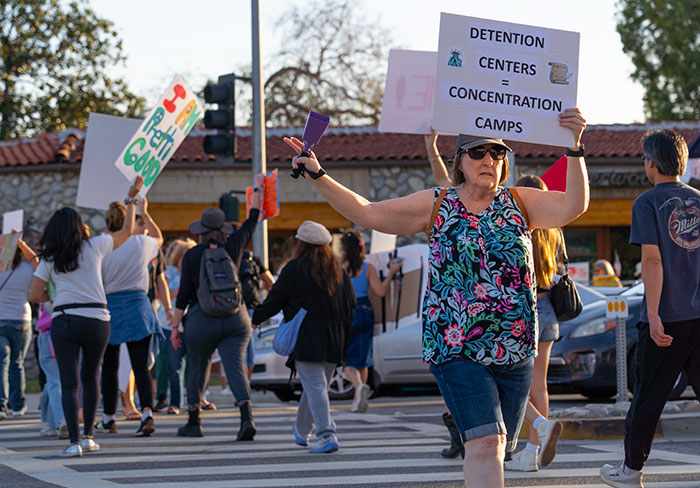Judge rejects Claremont’s bid for local water control
Claremont’s quest to take over the water system suffered a devastating setback last week, and now the city plans to respond.
In a 38-page tentative decision handed down on November 10, Los Angeles Superior Court Judge Richard Fruin refuted the city’s claims for eminent domain made during the weeks-long trial, which concluded August 11.
The Claremont City Council met in a closed-session Wednesday night in response to Judge Fruin’s tentative decision, and began drafting a response to the court on Thursday. The city has 15 days from the date of the decision to respond to the judge and try to change his mind.
If the judge’s decision remains, the city would draft a formal appeal to be voted on by the city council, according to a press release.
The city was tasked with convincing the judge to determine that local control over the water system—as opposed to the patronage of the investor-owned utility Golden State Water Company (GSW)—proved a “more necessary use,” or served the public’s best interest. However, the city, as of now, has failed to convince the judge in that regard.
Judge Fruin noted early in the tentative decision the court was expecting some sort of list of reasons from the city council to support the takeover, but did not get one.
“However, so far as the court can discern, the City did not prepare any report that provides a complete list of reasons for its exercise of eminent domain powers to acquire the Claremont Water Assets,” Judge Fruin wrote.
The city’s original complaint, drafted in December 2014 after the passage of Measure W, did not properly identify reasons in support of claiming eminent domain of the water system, Judge Fruin said. Only in the first amended complaint, drafted in June 2015, did any supportive reasons appear.
The Resolutions of Necessity drafted by the city, Judge Fruin said, also failed to provide vital information in support of the takeover.
“The Resolutions [of Necessity] do not offer any factual findings for a taking of a privately-owned and operated water public utility,” Judge Fruin asserted.
The judge called out the city for not having any of the city councilmembers who voted on the resolutions of necessity testify at trial. The only city official noted throughout the tentative decision is City Manager Tony Ramos.
Mr. Ramos, who was designated by the city’s attorneys as the “person most knowledgeable” in regards to the takeover, said during testimony that lower water rates, which was billed as a paramount reason for taking over the water system, would not be a result of the eminent domain takeover.
In addition, the judge writes, Mr. Ramos testified the city did not plan to make any additional capital improvements once the water system is acquired. But the city allowed an expert witness, Michael Thornton, to testify that he would recommend a $6.9 million investment over two years on a number of projects, including installing pumps at the Pomello Reservoir and constructing a new reservoir at Johnson’s Pasture.
“It is difficult for the court to determine how Thornton’s testimony is relevant,” the judge wrote. “He is suggesting capital improvements that the City Manager testified that the city has no plans to undertake, and is implying that the cost of such improvements can be funded by further borrowing that can be repaid through higher water rates charged to Claremont’s subscribers.”
The court also rebuffed claims that greed on the part of GSW was a direct cause of the city’s water rates increasing, noting that the price escalations were caused not by GSW but by “extrinsic factors.” He also said the city mischaracterized the water rate adjustment mechanism (WRAM)—a surcharge held up by the city as an example of overcharging residents—as a “penalty.” The judge described WRAM as a “temporary fee” that is implemented against customers when water usage falls below the standard set by the Public Utilities Commission (PUC).
The judge also sided with GSW in regards to Claremont’s operational deal with La Verne, which would have allowed the city’s westerly neighbor to assist in operations should the city succeed in the takeover. GSW had stressed throughout the trial that La Verne was a sketchy operator, failing lead contamination tests, drafting incomplete consumer confidence reports and offering inferior maintenance.
The city tried to make the case during the trial that rate applications under local control would be more transparent under the Brown Act—which allows for public comment on any listed agenda item—and subject to review by the California Environmental Quality Act (CEQA). The judge asserted that while rate applications to the PUC are public but not tailored to public participation, it is the fault of the legislature and not GSW.
“The city has not demonstrated that Golden State’s decisions in its management of the Claremont water system are less than competent,” Judge Fruin wrote.
During public comment immediately preceding Wednesday’s closed-session meeting, residents expressed both support for the city and scorn over the case.
Sally Seven noted that legal counsel should have emphasized that local control would result in “no high-paid executives to support,” but was nonetheless supportive of city staff.
“I still think we have a good case and I think water is important,” Ms. Seven said.
Betty Crocker said that she had “never felt so hopeless” after opening her water bill after the decision, and told the council the city was counting on them to win the case.
“We are with you,” she said. “We’ll stand on street corners. We’ll raise more money. We’ll put more yard signs up. You tell us what we want, but we need all five of you on board.”
Jacob Patterson said the tentative decision was avoidable, had the city relayed the proper findings to the court.
“Hopefully, maybe we can convince [Judge Fruin] that he was wrong, but this is not the case of a judge—who doesn’t have any eminent domain experience—not understanding the law,” he said. “This is somebody who, when I read this decision, he’s like, you guys had everything handed to you and you still failed.”
But the most scathing comments came from resident Jim Belna, who has been a fixture in the opposition to the takeover for years. He called Claremont’s feasibility study a fraud, admonished the council for the money spent during the trial and accused the council of listening to “self-deluded activists and opportunistic lawyers who flattered you and told you what you wanted to hear.”
“Eminent domain fantasy camp is now officially over,” he added.
—Matthew Bramlett
news@claremont-courier.com








0 Comments